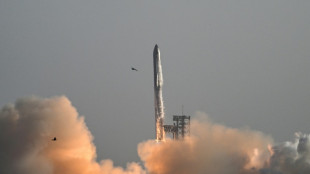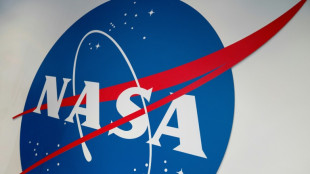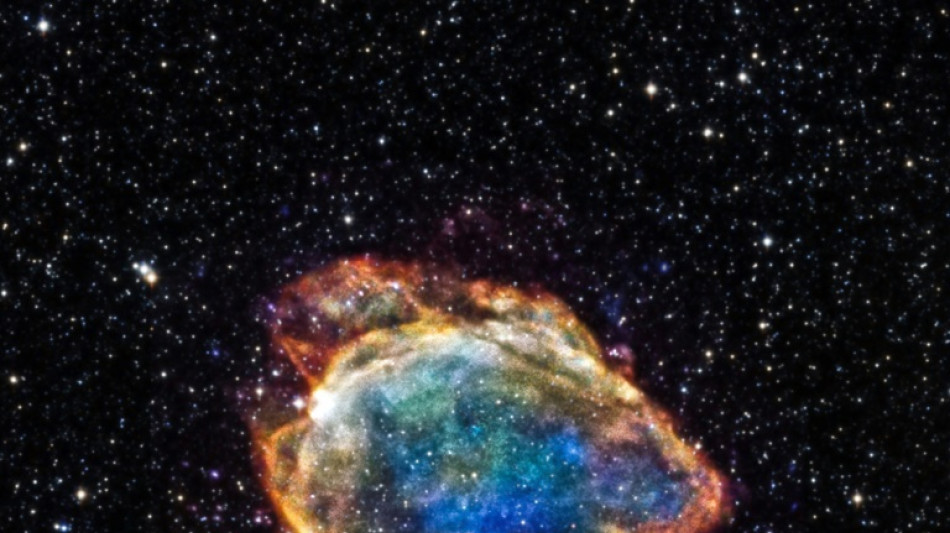
-
 Three in a row Piastri wins in Miami to lead McLaren one-two
Three in a row Piastri wins in Miami to lead McLaren one-two
-
Scheffler ties 72-hole PGA record in CJ Cup Byron Nelson romp

-
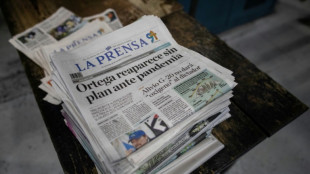 Nicaragua says quitting UNESCO over press prize award
Nicaragua says quitting UNESCO over press prize award
-
Oscar Piastri wins Miami Grand Prix to lead McLaren one-two

-
 Bednarek runs this year's world-best 200m to win at Miami Grand Slam
Bednarek runs this year's world-best 200m to win at Miami Grand Slam
-
'Lucky number seven' for Ruud after beating Draper to clinch Madrid Open

-
 China's Zhao leads Williams 11-6 in world snooker final
China's Zhao leads Williams 11-6 in world snooker final
-
Far-right candidate tops Romania's presidential rerun
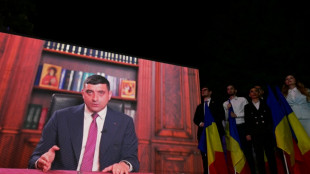
-
 Ryu takes wire-to-wire win at LPGA Black Desert Championship
Ryu takes wire-to-wire win at LPGA Black Desert Championship
-
Marseille held by fellow Champions League hopefuls Lille

-
 'Lonely' Palou cruises to win at IndyCar Alabama Grand Prix
'Lonely' Palou cruises to win at IndyCar Alabama Grand Prix
-
Zelensky says does 'not believe' Russian truce pledge

-
 US Fed expected to pause rate cuts again, await clarity on tariffs
US Fed expected to pause rate cuts again, await clarity on tariffs
-
Ruud beats Draper to win Madrid Open and claim maiden Masters

-
 Far-right candidate leads Romania's presidential rerun
Far-right candidate leads Romania's presidential rerun
-
Parag's six sixes in a row, Pant flops in IPL

-
 Howe hails Newcastle's 'ruthless' Isak after VAR drama in Brighton draw
Howe hails Newcastle's 'ruthless' Isak after VAR drama in Brighton draw
-
Pant woes continue as Lucknow lose to Punjab in IPL

-
 'Thunderbolts' strikes big, topping N.America box office
'Thunderbolts' strikes big, topping N.America box office
-
Kompany player-led shake-up returns Bayern to Bundesliga summit

-
 Leverkusen draw hands Kane's Bayern Bundesliga title
Leverkusen draw hands Kane's Bayern Bundesliga title
-
Chelsea sink champions Liverpool, Man Utd crash at Brentford

-
 Bielle-Biarrey lifts Bordeaux past Toulouse and into Champions Cup final
Bielle-Biarrey lifts Bordeaux past Toulouse and into Champions Cup final
-
Chelsea beat champions Liverpool to boost top five push

-
 Hammers' Potter reveals Paqueta's tears of frustration at Spurs draw
Hammers' Potter reveals Paqueta's tears of frustration at Spurs draw
-
Lyon's Champions League hopes hit by loss to Lens

-
 Israel vows retaliation against Iran, Yemen's Huthis over airport attack
Israel vows retaliation against Iran, Yemen's Huthis over airport attack
-
Man Utd 'need to change' after Brentford loss: Amorim

-
 China's Zhao dominates Williams 7-1 in first session of World Snooker final
China's Zhao dominates Williams 7-1 in first session of World Snooker final
-
Zelensky says does 'not believe' Russian truce promises

-
 Bielle-Biarrey double lifts Bordeaux past champions Toulouse and into Champions Cup final
Bielle-Biarrey double lifts Bordeaux past champions Toulouse and into Champions Cup final
-
Trump says 'I don't know' if must uphold US Constitution as president

-
 Brazil police foil Lady Gaga gig bomb plot
Brazil police foil Lady Gaga gig bomb plot
-
Godolphin in full bloom as Desert Flower wins 1000 Guineas

-
 Almeida wins Tour de Romandie as Evenepoel claims closing time-trial
Almeida wins Tour de Romandie as Evenepoel claims closing time-trial
-
Bolsonaro leaves hospital three weeks after abdominal surgery

-
 Man Utd crash at Brentford, Isak rescues Newcastle
Man Utd crash at Brentford, Isak rescues Newcastle
-
Romanians vote in tense presidential rerun as far right eyes win

-
 Lyon see off Racing to set up Challenge Cup final against Bath
Lyon see off Racing to set up Challenge Cup final against Bath
-
Kolkata survive Parag's six-hitting blitz to clinch IPL thriller

-
 Israel vows retaliation against Yemen's Huthis over airport attack
Israel vows retaliation against Yemen's Huthis over airport attack
-
Mbappe maintains Real Madrid Liga dream in Celta thriller

-
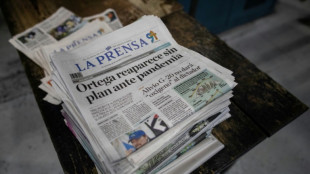 UNESCO says Nicaragua quitting over press prize award
UNESCO says Nicaragua quitting over press prize award
-
Church donation box goes digital in Greece

-
 Germans mark liberation of Ravensbrueck Nazi camp
Germans mark liberation of Ravensbrueck Nazi camp
-
Missile hits Israel airport area in Huthi-claimed attack

-
 DeChambeau eyes PGA Championship battle after South Korea LIV win
DeChambeau eyes PGA Championship battle after South Korea LIV win
-
Chinese president to visit Russia on May 7-10: Kremlin

-
 'We don't care': weddings go on in Pakistan's Kashmir border
'We don't care': weddings go on in Pakistan's Kashmir border
-
Missile hits Israel airport area in attack claimed by Yemen's Huthis


Record measurement of universe suggests 'something is fishy'
The most precise measurements ever made of the universe's composition and how fast it is expanding suggest "something is fishy" in our understanding of the cosmos, the astrophysicist who led the research said Wednesday.
The comprehensive new study published in The Astrophysical Journal further confirmed that there is a significant discrepancy between two different ways to estimate the speed at which the universe is expanding.
The study said that around five percent of the universe is made up of what we might think of as normal matter, while the rest is dark matter and dark energy -- both of which remain shrouded in mystery.
Dark energy, a hypothetical force causing the universe to expand at an ever-increasing rate, makes up 66.2 percent of the cosmos, according to the study published in The Astrophysical Journal.
The remaining 33.8 percent is a combination of matter and dark matter, which is also unknown but may consist of some as-yet-undiscovered subatomic particle.
To arrive at the most precise limits yet put on what our universe is made up of, an international team of researchers observed exploding stars called supernovae.
They analysed the light from 1,550 different supernovae, ranging from close to home to more than 10 billion lights year away, back when the universe was a quarter of its current age.
"We can compare them and see how the universe is behaving and evolving over time," said Dillon Brout of the Harvard–Smithsonian Center for Astrophysics and lead author of the study, called Pantheon+.
- Two decades of analysis -
The study updated the data from the Pantheon project a couple of years ago, stamping out possible problems and nailing down more precise calculations.
"This latest Pantheon+ analysis is a culmination of more than two decades' worth of diligent efforts by observers and theorists worldwide in deciphering the essence of the cosmos," US astrophysicist Adam Reiss, 2011's physics Nobel winner, said in a statement.
It was by observing supernovae back in the late 1990s that Reiss and other scientists discovered the universe was not only expanding but also doing so at an increasing rate, meaning galaxies are racing away from each other.
"It was like if you threw a ball up, and instead of the ball coming down, it shot up and kept accelerating," Brout said of the surprise of that discovery.
Pantheon+ also pooled data with the SH0ES supernova collaboration to find what is believed to be the most accurate measurement for how rapidly the universe is expanding.
They estimated the universe is currently expanding 73.4 kilometres a second every megaparsec, or 3.26 million light years. That works out to be around 255,000 kilometres (160,000 miles) per hour, according to a Harvard-Smithsonian statement.
But there's a problem.
- The Hubble tension -
Measuring cosmic microwave background radiation, which can look much farther back in time to around 300,000 years after the Big Bang, suggests the universe is expanding at a significantly slower rate -- around 67 kilometres per megaparsec.
This discrepancy has been called the Hubble tension, after US astronomer Edwin Hubble.
The Pantheon+ results have raised the certainty of the Hubble tension above what is known as the five sigma threshold, which means the discrepancy "can no longer be attributed to luck", Brout said.
"It certainly indicates that potentially something is fishy with our understanding of the universe," Brout told AFP.
Some possible, unverified theories for the discrepancy could include another kind of dark energy in the very early universe, primordial magnetic fields, or even that the Milky Way sits in a cosmic void, potentially slowing it down.
But for now, Brout said that "we, as scientists thrive on not understanding everything.
"There's still potentially a major revolution in our understanding, coming potentially in our lifetimes," he added.
Y.Kobayashi--AMWN

